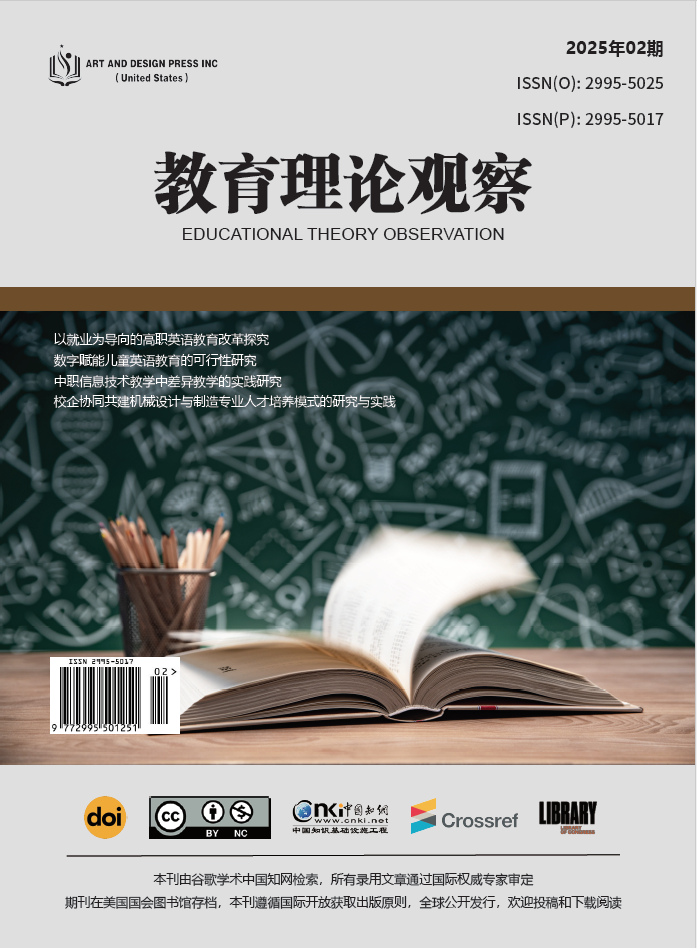Volume 3,Issue 2
Fall 2025
“AI+法律科技”赋能涉外法治人才培养之路径研究——以北京地区为例
随着全球化进程的不断推进和人工智能技术的迅猛发展,法律行业面临着前所未有的挑战与机遇。以北京地区为例,涉外法治人才的培养亟需与时俱进,提升其国际化能力和跨境法律事务处理能力。本文旨在探讨如何通过“AI+法律科技”的融合,赋能涉外法治人才的培养,提升其跨境法律事务处理效率和国际化视野。本文通过对当前法治人才培养模式的分析与调研,揭示了现有法律教育体系中的不足之处,提出AI技术在法律教育、国际法律事务处理、跨国文化适应等方面的应用路径。通过案例分析,展示了AI技术在国内外法治人才培养中的应用成效,分析了成功经验,提出了北京地区可借鉴的策略。最后,就如何优化AI在法治人才培养中的应用路径,本文提出了具体的政策建议,旨在推动AI技术与法律教育的深度融合,为培养具备国际化视野和跨境法律处理能力的法治人才提供理论依据和实践指导[26-30]。
[1]王江红,李文. AI+法律科技发展现状与法律实务应用[J]. 法学研究, 2020,41(3):85-97.
[2]张蕾.人工智能赋能法律行业的前景与挑战[J]. 现代法学,2021,43(6):50-62.
[3]李明.人工智能在法律教育中的应用研究[J].法学论坛,2019,35(4):77-84.
[4]刘峰,陈静.AI技术助力涉外法治人才培养的路径探讨[J]. 中国法学, 2021,40(2):102-115.
[5]周杨.法学教育创新与人工智能的结合[J].法制与社会发展, 2020,28(3):93-100.
[6]刘波.基于AI技术的跨境法律事务智能化管理[J]. 中国法律评论, 2021,42(5):145-158.
[7]赵雷, 高翔.人工智能技术在法律服务中的应用与挑战[J]. 法学评论, 2022,36(1):34-45.
[8]王蕊. AI在国际仲裁中的应用前景[J].国际法学, 2020,34(2):20-28.
[9]王永杰.跨境法律事务中的智能辅助决策系统应用[J].现代法学研究, 2019,33(4):89-95.
[10]李婷,张斌.人工智能驱动下的法治人才教育新模式[J]. 法学研究与实践, 2021,41(3):120-130.
[11]Chen, Wei, and Yao Zhang. “The Impact of Artificial Intelligence on Legal Education and Practice.” Journal of Law and Technology, vol. 15, no. 2, 2021, pp. 35-49.
[12]Davis, Kevin, and Richard Walker. “Legal Tech and AI: Transforming the Legal Profession.” Law and Innovation Review, vol. 33, no. 4, 2020, pp. 150-163.
[13]Cooper, James. “Artificial Intelligence and the Future of Cross-Border Legal Work.” Harvard International Law Journal, vol. 61, no. 1, 2020, pp. 80-98.
[14]Smith, Helen. “AI in the Legal Industry: Opportunities and Challenges.” Journal of Legal Studies, vol. 40, no. 5, 2022, pp. 60-75.
[15]Johnson, Michael, and David Taylor. “Artificial Intelligence in International Arbitration.” International Arbitration Journal, vol. 28, no. 3, 2021, pp. 45-57.
[16]Brown, Claire. “The Role of AI in International Legal Education.” Global Legal Education Review, vol. 18, no. 2, 2020, pp. 120-133.
[17]Lee, Susan. “AI and the Global Legal Marketplace: A New Paradigm.” International Law and Technology Review, vol. 24, no. 1, 2021, pp. 10-22.
[18]Kessler, Robert, and Eva Green. “AI in Legal Practice: Enhancing International Legal Capabilities.” Journal of Global Legal Affairs, vol. 32, no. 3, 2020, pp. 200-215.
[19]Morgan, Julian. “Artificial Intelligence and Its Role in Legal Risk Management.” Risk and Compliance Journal, vol. 22, no. 4, 2022, pp. 18-32.
[20]Taylor, Stephanie. “Legal AI and the Future of Cross-Border Dispute Resolution.” Dispute Resolution Review, vol. 28, no. 2, 2021, pp. 50-65.
[21]Harris, Peter. “AI Technologies in Legal Services: The Case of Cross-Border Transactions.” Journal of Law and Business, vol. 19, no. 3, 2021, pp. 134-145.
[22]Bennett, Laura. “The Impact of AI on Legal Education and Its International Implications.” International Journal of Law and Education, vol. 35, no. 6, 2020, pp. 98-110.
[23]Williams, George, and Thomas Harris. “AI in the Legal System: A Global Perspective.” Journal of Comparative Law, vol. 42, no. 4, 2021, pp. 160-175.
[24]Foster, Jessica. “AI and Legal Ethics: Implications for Cross-Border Practice.” Ethics and Law Review, vol. 20, no. 2, 2021, pp. 110-121.
[25]Jameson, Edward. “AI for Legal Professionals: Enhancing Cross-Border Negotiations.” Legal Technology Journal, vol. 18, no. 5, 2021, pp. 30-44.
[26]北京市人民政府. 《北京市关于推动法治人才培养的实施意见》. 北京市人民政府办公厅, 2020.
[27]北京市司法局. 《北京市人工智能与法律结合应用研究报告》. 北京市司法局, 2021.
[28]北京市人民政府. 《北京市法律科技创新与发展规划》. 北京市人民政府办公厅, 2019.
[29]《中华人民共和国民法典》. 2020, 人民出版社.
[30]《中华人民共和国网络安全法》. 2017, 法律出版社.
[31]General Data Protection Regulation (GDPR). 2018, European Council.

